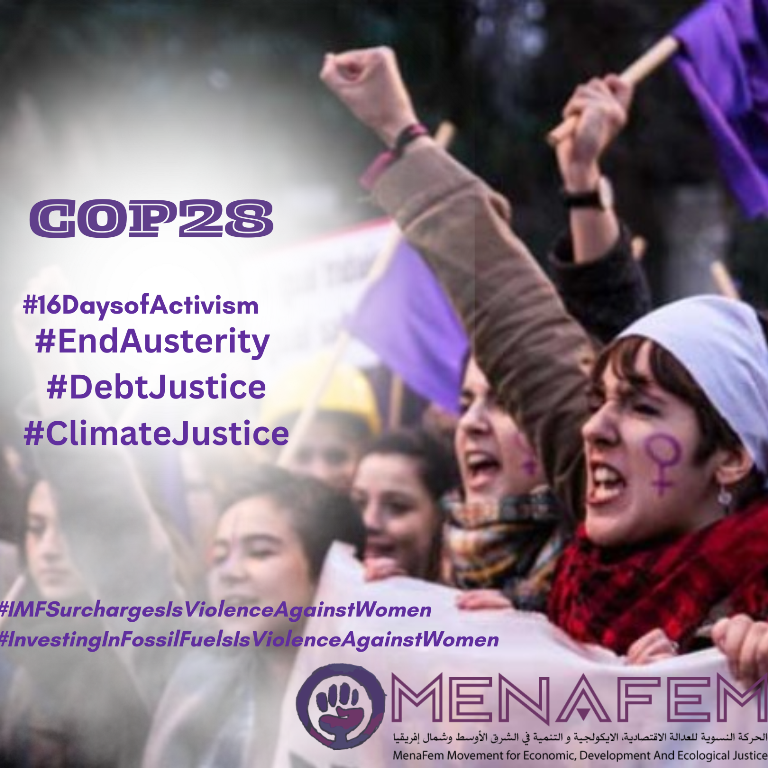MenaFem Movement’s Urgent MENA Demands for Climate Justice at COP28
As COP28 kicks off in the Middle East and North Africa MENA, MenaFem Movement and its partners and feminist groups, steps up to make sure women’s voices are heard loud and clear. Coming after the outcomes of COP27 in Egypt and the ongoing session in Dubai, UAE, MenaFem sees this as a chance to spotlight the concerns of MENA feminists, gender advocates, and climate activists.
MenaFem Movement is all about recognizing that women and their challenges need to be at the center of decisions made at COP28. Teaming up with local partners, MenaFem Movement aims to turn this year’s climate talks into a platform for real conversations and action.
Within the global South and the colonized, racially and economically stratified North, women, LGBTIQ and other marginalized communities are the first to suffer and die in increasingly common climate-related catastrophe. Climate change places women and girls at a heightened risk of harm, from unequal access to health care and resources to a higher risk of sexual violence, sexual exploitation and abuse, trafficking, and domestic violence1.
Giving the fact that the MENA region and Africa have a long history of colonialism,The colonial grabbing of land not only dispossessed people of territories and resources, it also altered what were previously sustainable native ecosystems. Addressing the effects of climate change cannot be achieved without also addressing the legacies of colonialism.2
The MENA region is dealing with tough climate problems—heatwaves, droughts, and more, as a recent report3 by the Carnegie Endowment for International Peace explains. Sadly, it’s the less privileged countries that will feel the impact the most, while oil-exporting nations struggle to shift to clean energy.
Women rely heavily on natural resources but face limited access. In numerous areas, women shoulder a disproportionate burden in securing essentials like food, water, and fuel. Agriculture, a key sector for women in low-income countries, becomes even more crucial during droughts. As primary providers, women work harder to sustain their families.
Studies show that in the MENA region, women are hit hardest by climate change, War and economical crisis they face problems like not having enough water and food, losing income, and having to leave their homes. Austerity measures in many countries in the region make things even tougher,and harder for women to get what they need to deal with any kind of resilience or even mitigation.
Climate change affects women and girls most acutely because it exacerbates the existing outcomes of entrenched gender inequality.
Although women, especially in rural areas, face bigger risks from climate issues. , they play a huge role in managing natural resources and making sure things keep going.
In addition to that its “threat multiplier”, meaning it escalates social, political and economic tensions in fragile and conflict-affected settings.
One distressing consequence has been the growing prevalence of child marriage and the denial of education opportunities for girls. These distressing trends have gained ground due to the decline in the daily and monthly incomes of families heavily reliant on agriculture, which today faces the most severe forms of desertification. This challenge is especially pronounced in Syria and Iraq. Additionally, the scarcity of natural resources exacerbates the situation, with severe consequences for people’s health. For instance, Tunisia and Algeria are grappling with a surge in diseases caused by stagnant and polluted water sources. These dire circumstances disproportionately affect women and children residing in households.
Decision–making processes
Although The MENA region faced many Ecological disasters this year 2023 between floods in Libya and Morocco earthquake, governments often fail to perceive climate change because of the heavy burden of debt that prevent them from facing the climate crisis or meet their SDGS .
In the MENA region, women are not adequately represented in formal decision-making spaces that deal with environmental policies. This lack of representation hinders the integration of diverse perspectives and limits the potential for comprehensive climate solutions.
The effects of climate change are not evenly distributed and have unique impacts on individuals, societies, and ecosystems. Women often experience heightened vulnerability as a result of poverty and political exclusion and rely heavily on natural resources for their livelihoods.
So, what next?
Resolving these inequalities is not only a matter of social justice but also a crucial step towards improving climate resilience. Empowering women in the region can result in more inclusive, sustainable, and effective feminist approaches to combating the effects of climate change.
MenaFem Movement fervently calls for the adoption of these crucial demands:
- Demand immediate debt cancellation for climate .
- Reparation not Aids, including comprehensive processes covering private, governmental, and multilateral creditors.
- Cease funding fossil fuels, hold polluters accountable, and facilitate a fair, fast, and funded fossil fuel phase-out. Reject false solutions like carbon capture and storage.
- Prioritize community-led renewables, uphold rights in projects, democratize economic decision-making for Global South governments, and ensure fair SDR allocations for climate action.
- Inclusive Engagement: Ensure diverse representation of women, girls, and marginalized communities in climate decision-making.
- Climate Finance Justice: Advocate for fair, gender-responsive, and localized climate finance to support vulnerable communities.
- Gender-Transformative Policies: Implement conflict-sensitive, gender-transformative approaches in climate action, prioritizing women in conflict-affected areas.
- Resilient Agriculture: Support gender-inclusive approaches for climate-resilient agriculture, ensuring equitable access for women farmers.
- Equitable Technology Access: Demand inclusive climate technologies, fostering innovation for all, with a focus on vulnerable communities.


